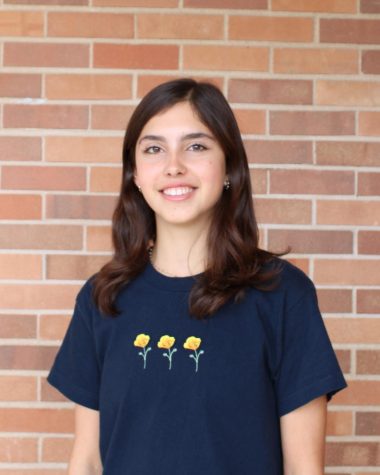Universal masking: At home to hybrid learning
October 31, 2020
In an unforeseeable and historical time, the COVID-19 pandemic has forced a global lockdown. While most Illinois students have been learning remotely since March 2020, medical professionals have been spending extraordinary amounts of time in their hospitals caring for sick patients.
After nearly three months of remote instruction, District 211 transitioned to hybrid learning on Oct. 26. For many Fremd students, this means that they will be able to return to the school building for some in-person learning.
A survey sent out to parents by District 211 gave all students the option to either continue at-home learning or take part in the hybrid scenario. Those who have chosen to return have been split into two groups, green and gold, that will alternate weeks going to school and attending class online.
Many parents have grappled with the question of whether to allow their children to return to on-site classroom teaching.
Pediatrician and Chair of Pediatrics at Aurora Medical Center Dr. Sheri Rocco explained that the answer is anything but straight-forward.
“It depends on many different factors. There is no one right answer,” Rocco said. “It’s only the answer that’s right for that particular student.”
Some factors students and parents have had to consider when making this decision include whether a student has pre-existing medical conditions, whether there is a family member in the home who is at a higher risk, and the specifics of the school itself.
“The example I give everybody is if you have a school that is overcrowded and was built one hundred years ago with awful ventilation, that’s going to be higher risk than a school that has more space to spread out,” Rocco said.
Like the fully-remote scenario, A-day and B-day schedules will alternate and class periods will be an hour long with 15 minute breaks between. Additionally, students at school will have 5 minutes to move between their classes. Students will be released in thirds, and when they leave, the teachers will spray each desk with a disinfectant.
In addition to frequent sanitation of high touch surfaces, the school will adhere to safety protocols implemented to prevent the spread of COVID-19. Mask-wearing and six feet social distancing of students and staff will be enforced. Before arriving at school, all students must complete a daily wellness survey and their temperature will be scanned as they enter the building.
Along with the new alterations while entering the school, many changes will also occur directly inside the classroom. Teachers face the challenge of instructing students in person and through Zoom simultaneously.
English teacher Marylin Berdick explained that students may not be prepared for the difficulties attached to in-person learning.
“School is not the same just because students will be back in person,” Berdick said. “Things have changed here drastically. Students cannot hang out with friends anywhere. All students are either in class or in a designated area the entire time they are here.”
The return to school may be exciting for many, however it raises the issue of maintaining health and safety for students and faculty, in order to continue to offer in-person opportunities.
According to Director of Community Relations Tom Petersen, District 211 has launched an online dashboard monitoring health metrics provided by the Illinois Department of Public Health (IDPH) and the Cook County Department on coronavirus.
“The D211 COVID-19 Dashboard will be updated daily on school days with available COVID-19-related data for District 211 staff members and students, including the number of positive COVID-19 cases” Petersen said.
The data included in this tool will be used to update the District’s eligibility for in-person learning based on schools’ ability to maintain a healthy environment.
Petersen reported that so far in-person activities and programs have successfully adhered to safety protocol throughout District 211, pointing to a safe return on Oct. 26.
Although the pediatric population as a whole has so far tended to have high recovery rates from COVID-19 infections, Rocco has seen increasing numbers of children in her practice who have tested positive for the virus.
“I’ve had little ones, (kids who are as young as) fifteen months old, and I’ve had lots of school-aged kids, including elementary, junior high, and high school students,” Rocco said.
Rocco noted that most of the kids who are testing positive for COVID-19 in her experience have been attending in-person classes or are involved in sports. She explained that some sports are safer than others for students to be participating in at this time.
While attending in-person classes does pose some risk, staying home for months on end comes with its own perils.
“We’re seeing a lot more depression, a lot more loneliness, and a lot more anxiety as the kids are staying home,” Rocco said.
Due to the lack of social interaction as well as the unpredictable course of the virus, the mindset and mentality of many teenagers and younger students has been severely impacted. The incidence of student substance abuse, anxiety, and depression is rising.
In terms of activities and athletics, students have not been able to have the full Fremd experience for months now. Sophomore Kenneth Shengena believes that, while athletics have been a bright spot, not attending school is a difficult reality.
“I really want to go back to school. I’m glad we’re in sports for the most part, but I miss school,” Shengena said.
Sophomore Gavin Ratigan believes that his education has changed due to E-Learning.
“I would be so much smarter if I was in school and would actually be willing to study and work for my grades,” Ratigan said. “It’s so hard to focus at home and even though I never thought I would miss school, I do.”
In the midst of uncertainty due to the pandemic, learning at school will be widely different than it has in previous years. Students, teachers and faculty alike will have to adjust to the new circumstances presented daily.
Assistant principal Eric Dolen believes that it’s important to focus on the positives in this scenario.
“In this day, I think a lot of the time we are able to focus on the things that aren’t going as well,” Dolen said. “It’s important to think about what we can be thankful for and take advantage of.”



